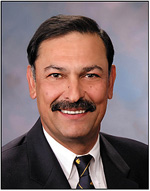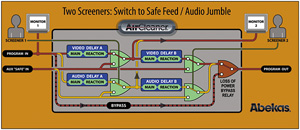The Cost of Delay
The professional video industry's #1 source for news, trends and product and tech information. Sign up below.
You are now subscribed
Your newsletter sign-up was successful
LOS ANGELES
Broadcasters are still pondering the ramifications of the Supreme Court's first ruling on broadcast indecency in 30 years earlier this month. The decision also raised the issue of whether advances in audio/video delay technology to protect the public from indecent utterances could influence an issue that primarily rests on the First Amendment.
In 2004, the FCC put broadcasters on notice that aired profanity could subject them to steep fines. Inciting the change was CBS' broadcast of Janet Jackson's exposed breast at the 2004 Super Bowl, which followed the use of the "f-word" by Bono during NBC's broadcast of the 2003 Golden Globe Awards, and by Cher and Nicole Richie in Fox's broadcasts of the 2002 and 2003 Billboard Music Awards. Although Fox was not fined, it filed suit, arguing that the FCC's new policy was unclear and violated free speech rights.
Two years ago, the 2nd U.S. Court of Appeals in New York struck down the new FCC policy as "arbitrary and capricious" under the 1946 Administrative Procedure Act, the blueprint by which federal agencies propose and establish regulations. The Justice Dept. appealed to the Supreme Court.
'TECHNOLOGY ADVANCES'
In writing the Opinion of the Court for the majority, Supreme Court Justice Antonin Scalia stated, "The fact that technological advances have made it easier for broadcasters to bleep out offending words further supports the Commission's stepped-up enforcement policy." But the decision also remanded the case to the Second Circuit Court for further proceedings regarding constitutionality.
Fox responded to the courts decision by stating, "While we would have preferred a victory on Administrative Procedure Act grounds, more important to Fox is the fundamental constitutional issues at the heart of this case. Fox is looking forward to the 2nd Circuit's consideration of the very important issues at stake in this case, and are optimistic that we will ultimately prevail when the First Amendment issues are fully aired before the courts.
A NEW FCC
In addition to the promise of new criteria for consideration, cautious optimism hinged on the expected emergence of a "new FCC" headed by Julius Genachowski, who was nominated in January. On April 30, President Obama also announced plans to nominate Mignon Clyburn, a member of the Public Service Commission of South Carolina and daughter of House Majority Whip Jim Clyburn, for another FCC seat, replacing Jonathan Adelstein. If Clyburn and Genachowski are confirmed, there will be three Democrats, including incumbent Michael Copps. Robert McDowell is currently the only Republican FCC commissioner; a second Republican commissioner to replace Deborah Taylor Tate, who left the commission in December, has not yet been named.
Fox declined to offer official comment on the network's day-to-day responsibilities to guarantee profanity-free live feeds. In the FCC's Reconsideration Order regarding Nicole Richie's offense, the commission said, "We recognize that no delay and editing system is foolproof and that there is always a possibility of human error in using delay equipment to edit live programming. The Commission can and will consider these facts in deciding what, if any, remedy is appropriate."
Although the FCC acknowledged that 5-second delay equipment was used in both broadcasts, it deemed the efforts to prevent profanity from airing were insufficient. Thus, having the technology alone does not necessarily satisfy compliance; human error is a big factor.
According to Stan Statham, president of the California Broadcasters Association, today's equipment is "almost foolproof, but you never know what someone will do."
THE COSTS OF MONITORING

Junaid Sheikh, president, Abekas Two factors prompted technological change: the upgrade to digital platforms and the Janet Jackson incident.
"Manufacturers thought of it [the Super Bowl incident] as an opportunity, and advances were made," said Junaid Sheikh, president of Menlo Park, Calif.-based Abekas.
The advances focused on cost reduction and safety features (particularly the programmable buffer that compensates for the time lapsed between making and catching the profanity). Users can switch the audio to another source, mute it or, in the case of Abekas, offer a garbled version.
Manufacturers estimated the overall cost (hardware, installation, and maintenance) at $20,000 or less. Pixelmetrix charges $10,000 for its DVShift; Abekas charges $7,500 for its AutoClean system. Evertz said that pricing for its HDSD 9545 DLY-PRO video/audio delay processor varied, depending on options. Algolith's PDS-1001-MD Profanity Delay System is a free software download available to owners of its $5,995 Algogear processor card.
(click thumbnail)
This diagram shows how Abekas AutoClean processes and "garbles" objectionable audio content. "That card can run multiple products," said Yvan Ouellet, president and CEO of the Montreal-based Miranda Technologies' spinoff. "Clients who buy the card can run the Profanity Delay System when they need it and configure it to be something else [for example, an up/down converter] outside of the live program hours."
Those prices are hugely different from the $100,000 estimate for the installation and annual operation of "bleeping/delay systems" cited by Supreme Court Justice Stephen Breyer in his dissent. Most of the difference is attributed to the manpower estimated to run the systems. Manufacturers disagree that most broadcasters need $80,000 or more a year for dedicated manpower.
"In a normal, average television environment, you don't need to put on a full time resource to do that," said Algolith's Ouellet. "In broadcasting, one person does different things." "For the two-hour high school football game you need to be diligent," said Pixelmetrix president Danny Wilson. "Other than that, they're pulling off the satellite—you put that [delay] responsibility to the point of origin."
Voice recognition software will not be incorporated into the profanity delay systems any time soon despite notable advances by the security industry.
"If you want zero risk, you're still going to need to have a warm body monitoring what's going on," said Ouellet.

The professional video industry's #1 source for news, trends and product and tech information. Sign up below.
